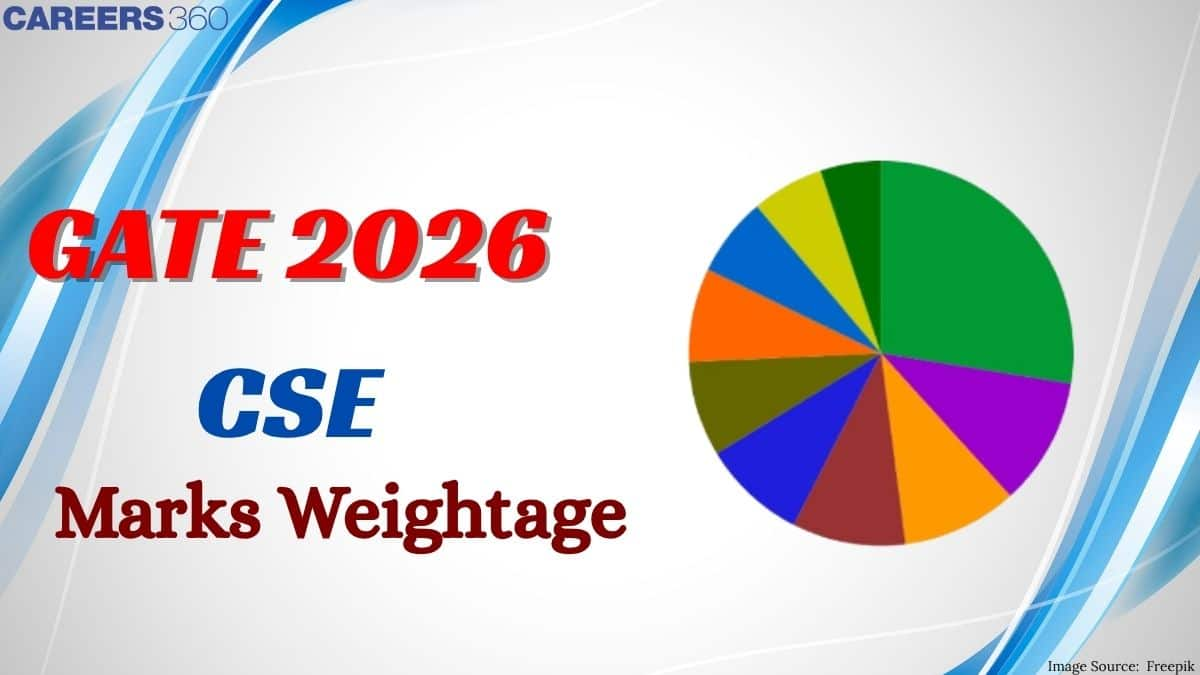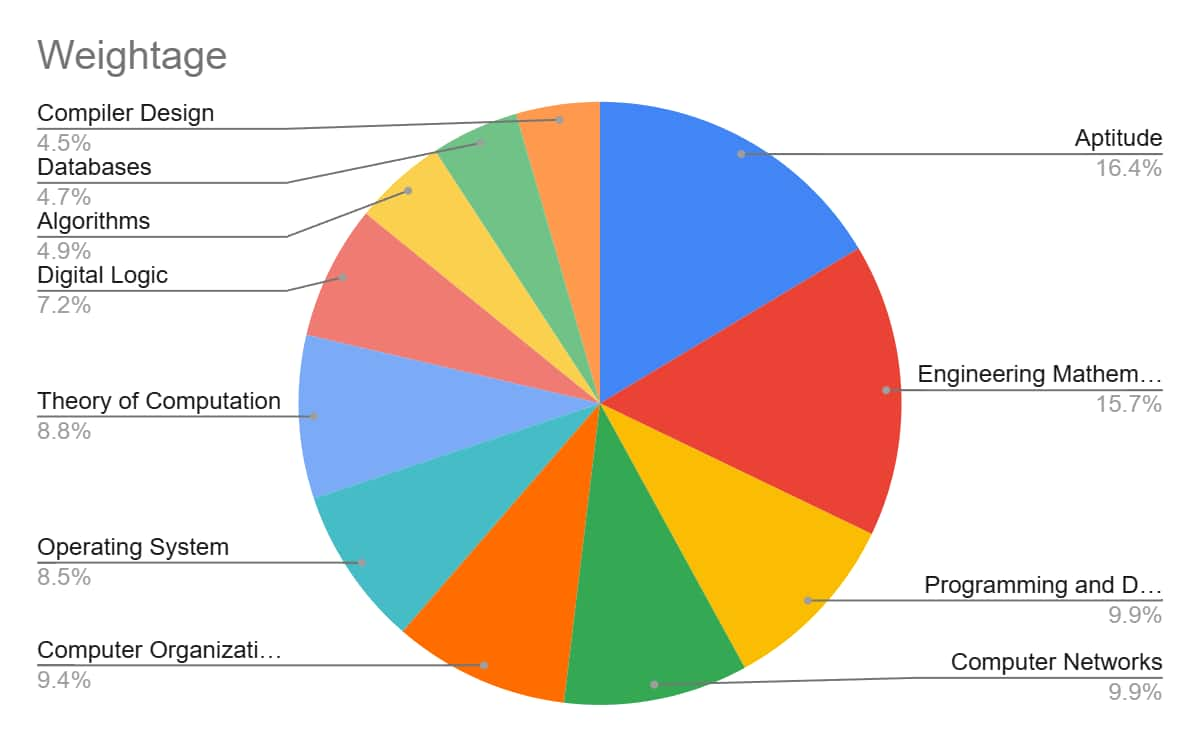GATE CSE Subject Wise Weightage 2026 - Topic wise Marks
GATE CSE Subject Wise Weightage 2026 - The Graduate Aptitude Test in Engineering (GATE) 2026 will be conducted by the Indian Institute of Technology Guwahati (IIT Guwahati) for admission to postgraduate programs and recruitment in leading PSUs. The official notification has been released on the official website, detailing the syllabus, eligibility, and application process. GATE CSE subject-wise weightage changes slightly every year, so aspirants must not only be thorough with the exam syllabus and pattern but also focus on high-weightage topics for effective preparation.
This Story also Contains
- GATE CSE Subject Wise Weightage- Last 5 Year
- GATE CSE 2026 Subject Wise Weightage
- Which Topic Has the Highest Weightage in GATE CSE?
- Key Benefits of GATE CSE Weightage

The GATE 2026 exam is scheduled for February 7, 8, 14 and 15, 2026 . The Computer Science Engineering (CSE) paper will comprise 11 key sections: General Aptitude, Engineering Mathematics, Digital Logic, Computer Organization & Architecture, Programming & Data Structures, Algorithms, Theory of Computation, Compiler Design, Operating System, Databases, and Computer Networks. The paper will feature Multiple Choice Questions (MCQ), Multiple Select Questions (MSQ), and Numerical Answer Type (NAT) questions. Understanding the subject-wise weightage will help candidates plan their study schedule strategically for maximum score improvement.
GATE CSE Subject Wise Weightage- Last 5 Year
It is important to know and understand subject-wise weightage of GATE CSE of previous years As here we are talking about GATE CSE, we have made a specific weightage table to refer for 2026 as per previous years weightages. Below you can check them:
Chapter | 2025 | 2024 | 2023 | 2022 | 2021 | Total (5 Years) | Weightage |
Engineering Mathematics | 16 | 23 | 11 | 12 | 11 | 73 | 16.40% |
Aptitude | 20 | 20 | 10 | 10 | 10 | 70 | 15.73% |
Computer Networks | 10 | 12 | 6 | 9 | 7 | 44 | 9.89% |
Programming and Data Structures | 17 | 11 | 9 | 4 | 3 | 44 | 9.89% |
Computer Organization & Architecture | 13 | 13 | 5 | 6 | 5 | 42 | 9.44% |
Operating System | 10 | 10 | 7 | 7 | 4 | 38 | 8.54% |
Databases | 9 | 12 | 3 | 8 | 7 | 39 | 8.76% |
Theory of Computation | 9 | 9 | 6 | 4 | 4 | 32 | 7.19% |
Digital Logic | 9 | 5 | 4 | 2 | 2 | 22 | 4.94% |
Compiler Design | 9 | 8 | 1 | 2 | 1 | 21 | 4.72% |
Algorithms | 8 | 7 | 3 | 1 | 1 | 20 | 4.49% |
Here is the detailed distribution of weightage you can refer to:

Also Read GATE: How to Prepare for CSE
GATE CSE 2026 Subject Wise Weightage
Effective preparation for GATE CSE 2026 requires an understanding of the GATE CSE 2026 subject-wise weighting, which helps you in ranking topics according to their significance on the test. The distribution of marks for each subject may differ slightly from year to year, even though the syllabus stays the same. By examining historical patterns, candidates can concentrate on high-weighted subjects like computer networks, theory of computation, algorithms, and data structures, which will improve time management and result in a higher score.
Chapter | Number of Questions Asked in Both Shifts |
Engineering Mathematics | 16 |
Aptitude | 20 |
Computer Networks | 10 |
Programming and Data Structures | 17 |
Computer Organization & Architecture | 13 |
Operating System | 10 |
Databases | 9 |
Theory of Computation | 9 |
Digital Logic | 9 |
Compiler Design | 9 |
Algorithms | 8 |
Grand Total | 130 |
Which Topic Has the Highest Weightage in GATE CSE?
Based on the last five years’ analysis, Engineering Mathematics holds the highest average weightage in GATE CSE, contributing around 16.40% of the total marks. Among the core technical subjects, Computer Networks and Programming & Data Structures each contribute about 9.89%, while Computer Organization & Architecture follows closely with 9.44%. Databases (8.76%) and Operating Systems (8.54%) are also significant contributors. Collectively, these high-weightage technical areas form the backbone of the GATE CSE paper, and mastering them can significantly boost overall performance.
Topics | Percent of Questions Asked |
C-Programming | 20% |
Data Structures | 20% |
Algorithms | 20% |
Digital Logic | 20% |
Computer Architecture | 20% |
Operating Systems | 20% |
Discrete Math | 20% |
Engineering Math | 20% |
DBMS | 25% |
Key Benefits of GATE CSE Weightage
1. Strategic Time Allocation
Knowing which subjects carry more marks allows you to allocate your preparation time proportionally. Instead of spending equal hours on every topic, you can dedicate more time to high-weightage areas like Engineering Mathematics, Computer Networks, and Programming & Data Structures, ensuring better return on your effort.
2. Focused Revision Planning
Weightage analysis helps in designing a targeted revision strategy. For example, if a subject like Compiler Design historically has low weightage, you can revise it quickly and invest more revision cycles in subjects with 8–12% weightage, which are more likely to yield higher marks.
3. Identification of High-Scoring Areas
Some topics are conceptually straightforward but carry high marks, such as General Aptitude and certain parts of Discrete Mathematics. Recognizing these “quick-gain” areas helps you secure marks with less time investment, boosting your score with minimal risk.
4. Tracking Year-to-Year Trends
By comparing past years’ data, you can identify whether a subject’s weightage is increasing, decreasing, or stable. This trend awareness can help you predict which topics might be emphasized in 2026 and adjust your preparation accordingly.
5. Boosting Exam Confidence
When you know exactly where marks are most likely to come from, your preparation feels more purposeful. This confidence reduces last-minute panic and allows you to enter the exam hall with a clear strategy, improving both speed and accuracy under pressure.
Also Read: How to Prepare for GATE
Frequently Asked Questions (FAQs)
The GATE score is valid for 3 years for admissions. PSUs may follow their own validity rules.
The GATE score is valid for 3 years for admissions. PSUs may follow their own validity rules.
No, they can still fetch easy marks; just allocate less time compared to major topics.
Yes, but core high-weightage subjects usually remain consistent over time.
There will be only one paper in GATE CSE (Computer Science and Information Technology.
The GATE CSE question paper pattern 2025 will have three major types of questions including MCQ, MSQ, and NAT.
The GATE Computer Science Engineering Syllabus includes topics, such as Engineering Mathematics, Digital Logic, Computer Organization, and Architecture, Programming and Data Structures, Algorithms, Theory of Computation, Compiler Design, Operating Systems, Databases, and Computer Networks.
Popular Courses and Specializations
List of colleges accepting GATE
Browse Engineering Colleges by State
Questions related to GATE
On Question asked by student community
Hello,
The link to the question paper is attached here. You can also find the answer key that will help you analyse your in-depth performance. Careers360 provides students with preparation tips that will help them utilise their time effectively in preparartion.
https://engineering.careers360.com/articles/gate-metallurgical-question-papers
Thank you
Hello,
Yes, you can get admission in M.Tech CSE without GATE .
-
Through university entrance exams
Many universities conduct their own M.Tech entrance exams. You have to qualify the test and sometimes attend an interview. -
Through JET for M.Tech
JET (JAIN Entrance Test) is conducted by Jain University.
It is
Hii
No you cannot get admission to IIT for M Tech if your B Tech is not completed at the time of admission, even if you clear the GATE cutoff but Yes, you can appear for GATE 2028 in your 3rd year of B Tech even if your degree is
Hello,
The link to the question paper is attached here. You can access the question papers along with the answer key on the careers360 website. Careers360 also provides students with preparation tips that will help them in preparing and the mock test and analyse their in-depth performance.
https://engineering.careers360.com/articles/last-15-years-gate-papers-solutions
Thank you.
Hello,
Here is a link for the sample papers for GATE Exam with DA subjects. Tap on the link given below to open it:
Thankyou.
M.Tech/M.Arch Admissions OPEN
Among top 100 Universities Globally in the Times Higher Education (THE) Interdisciplinary Science Rankings 2026
Chandigarh University Admissions 2026
ApplyNAAC A+ Accredited | Among top 2% Universities Globally (QS World University Rankings 2026)
UPES M.Tech Admissions 2026
ApplyLast Date to Apply: 25th Feb | Ranked #45 Among Universities in India by NIRF | 1950+ Students Placed 91% Placement, 800+ Recruiters
UEM Jaipur M.Tech Admissions 2026
Apply1st in NPTEL program of 6 IITs | Highest CTC 72 LPA | Scholarships to meritorious students
Amity University | M.Tech Admissions
ApplyAsia’s only university to be awarded the highest accreditation by WASC, USA and by the Quality Assurance Agency for Higher Education (QAA), UK
Symbiosis Online Programs
ApplyOnline PG programs from Symbiosis Centre for Distance Learning
